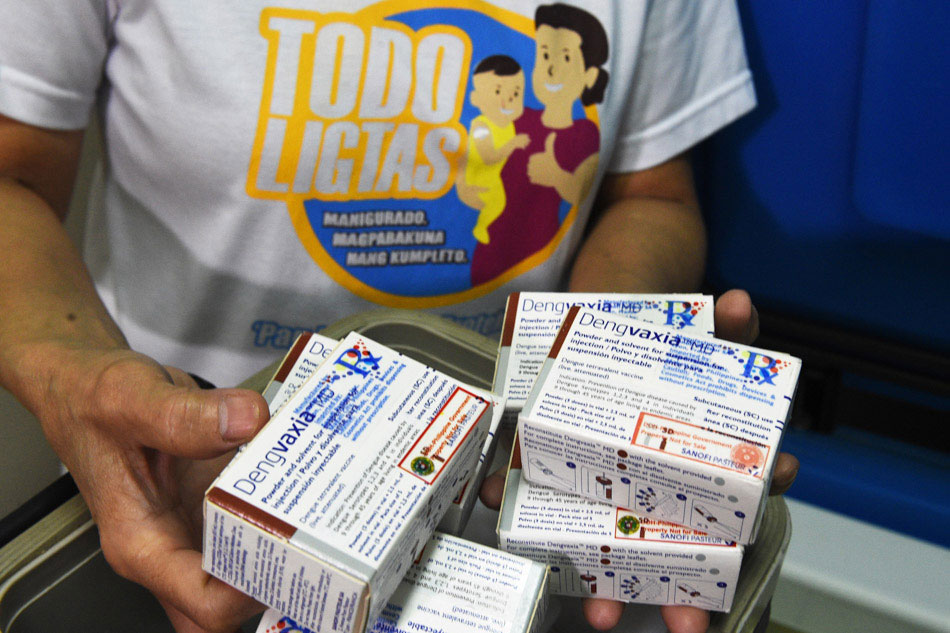WHO denies recommending Dengvaxia for nat'l immunization | ABS-CBN

Welcome, Kapamilya! We use cookies to improve your browsing experience. Continuing to use this site means you agree to our use of cookies. Tell me more!
WHO denies recommending Dengvaxia for nat'l immunization
WHO denies recommending Dengvaxia for nat'l immunization
ABS-CBN News
Published Dec 05, 2017 10:09 PM PHT
MANILA - The World Health Organization (WHO) Representative Office Philippines on Tuesday clarified that it did not prescribe in mid-2016 the use of dengue vaccine Dengvaxia in the Philippines' national immunization program.
MANILA - The World Health Organization (WHO) Representative Office Philippines on Tuesday clarified that it did not prescribe in mid-2016 the use of dengue vaccine Dengvaxia in the Philippines' national immunization program.
"The WHO position paper did not include a recommendation to countries to introduce the dengue vaccine into their national immunization programs. Rather, WHO outlined a series of considerations national governments should take into account in deciding whether to introduce the vaccine, based on a review of available data at the time, along with possible risks," the WHO Country Office said in a statement.
"The WHO position paper did not include a recommendation to countries to introduce the dengue vaccine into their national immunization programs. Rather, WHO outlined a series of considerations national governments should take into account in deciding whether to introduce the vaccine, based on a review of available data at the time, along with possible risks," the WHO Country Office said in a statement.
"These included the following: first, use of the vaccine should only be considered in areas where a high proportion (preferably at least 70%) of the community had already been exposed to the virus; second, the vaccine should only be provided to people 9 years of age and above; and third, people being vaccinated should receive 3 doses," it said.
"These included the following: first, use of the vaccine should only be considered in areas where a high proportion (preferably at least 70%) of the community had already been exposed to the virus; second, the vaccine should only be provided to people 9 years of age and above; and third, people being vaccinated should receive 3 doses," it said.
The WHO Country Office said it had acknowledged in "mid-April 2016 that these conditions appeared to be met in the 3 regions of the Philippines in which the dengue vaccination effort was already ongoing at that time – noting that the decision to roll out the vaccine had been taken by the DOH before WHO’s advice became available."
The WHO Country Office said it had acknowledged in "mid-April 2016 that these conditions appeared to be met in the 3 regions of the Philippines in which the dengue vaccination effort was already ongoing at that time – noting that the decision to roll out the vaccine had been taken by the DOH before WHO’s advice became available."
ADVERTISEMENT
The Philippines agreed in December 2015 to use and promote the vaccine, and WHO's position paper was released in July 2016. The WHO Country Office said this position paper was "based on recommendations of the Strategic Group of Experts on Immunisation which met and published preliminary advice in mid-April 2016."
The Philippines agreed in December 2015 to use and promote the vaccine, and WHO's position paper was released in July 2016. The WHO Country Office said this position paper was "based on recommendations of the Strategic Group of Experts on Immunisation which met and published preliminary advice in mid-April 2016."
Given the recent developments, the WHO Country Office said it is now waiting for "expert analysis of new data and advice" on the use of Dengvaxia.
Given the recent developments, the WHO Country Office said it is now waiting for "expert analysis of new data and advice" on the use of Dengvaxia.
"WHO looks forward to the advice of its Strategic Advisory Group of Experts on Immunization which will meet to review the new evidence next week," it said.
"WHO looks forward to the advice of its Strategic Advisory Group of Experts on Immunization which will meet to review the new evidence next week," it said.
The Philippine government last week suspended its dengue immunization program for public school students after French drugmaker Sanofi announced possible risks if the Dengvaxia is administered to individuals not previously infected with dengue.
The Philippine government last week suspended its dengue immunization program for public school students after French drugmaker Sanofi announced possible risks if the Dengvaxia is administered to individuals not previously infected with dengue.
The Philippines was the first country in Asia to approve the Dengvaxia vaccine for individuals aged 9 and 45 years old in 2015.
The Philippines was the first country in Asia to approve the Dengvaxia vaccine for individuals aged 9 and 45 years old in 2015.
The Department of Health procured P3 billion worth of Dengvaxia intended for one million public school children in areas reported to have the highest incidence of dengue in the same year.
The Department of Health procured P3 billion worth of Dengvaxia intended for one million public school children in areas reported to have the highest incidence of dengue in the same year.
As of November 2017, about 733,713 Filipino children have been given the anti-dengue vaccine.
As of November 2017, about 733,713 Filipino children have been given the anti-dengue vaccine.
ADVERTISEMENT
ADVERTISEMENT


